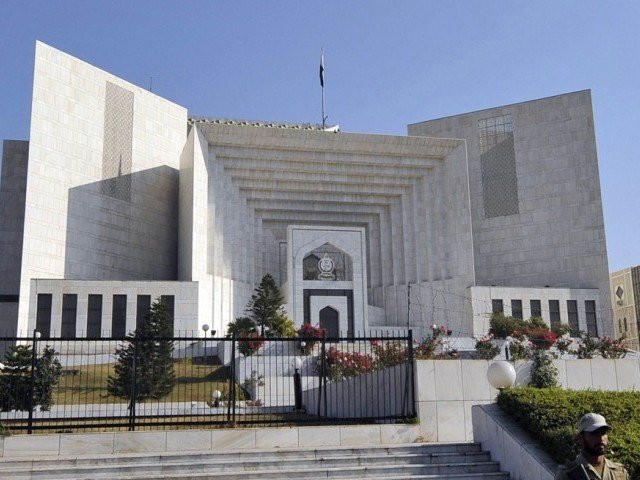Hurdles to public : SC seeks time frame from CDA for removing roadblocks
Asks civic agency to shift embassies to Diplomatic Enclave.

Supreme Court of Pakistan. PHOTO: AFP
The country’s top court on Wednesday sought a time-frame from civic authorities for removing blockades from roads and streets in the federal capital and to stop commercial activities in residential areas.
A two-member bench of the Supreme Court, comprising Justice Jawwad S Khawaja and Justice Sarmad Jalal, was hearing a suo motu case regarding encroachments and blockades in residential areas set up in the name of security, directed the civic authorities to issue notices to foreign embassies to remove the blockades from roads and streets.
“Why haven’t the foreign missions been shifted to Diplomatic Enclave...who will ask them to do so,” questioned Justice Khawaja.
He directed Capital Development Authority (CDA) Chairman Maroof Afzal to give a timeframe by February 9 as to when the 216 blockades would be removed, the embassies shifted to Diplomatic Enclave and commercial activities in residential areas brought to a halt.
Afzal submitted before the bench that the civic body was not authorised to issue notices to the embassies directly and sought time to contact the foreign office in this regard.
Justice Khawaja questioned whether Pakistani embassies in others countries were allowed to block roads in the manner that foreign missions are doing in Pakistan.
“All this happened because the CDA had shut its eyes,” he observed, adding that citizens were writing letters to the apex court claiming it was doing nothing except giving dates. “There is a dire need to show the public that the law still prevails in the country,” he observed.
The court asked Afzal to ensure that supremacy of law was maintained and nobody would be allowed to violate it.
Earlier, the CDA had submitted a 220-page report to the Supreme Court giving details of residential units being used for commercial purposes, and roads and streets closed for security reasons.
No approval has been sought from the CDA before the blocking of some 216 roads, streets and footpaths by the police, Inter-Services Intelligence (ISI), Intelligence Bureau (IB), Federal Investigation Agency (FIA), Rangers and administrations of embassies, government ministries, private concerns and individuals. These roads and streets have been closed by erecting fences, concrete blocks and security walls, the report added.
“No approval of any kind was sought from the CDA for these blockades,” the CDA admitted in its report. The court was also informed that the civic body has taken up the embassies’ issue with the Ministry of Foreign Affairs.
Non-conforming use of houses
During the previous hearing on December 17, the court had directed the CDA to hold a fresh survey to remove discrepancies in its earlier report on the issue.
The new report has counted 2,262 cases of non-conforming use of residential units.
The court was informed that the authority had recently removed encroachments and shut commercial activities in some 567 properties, while 1,015 cases are under trial at the deputy commissioner’s office, 149 cases are in different courts, while 1,695 residential units are still under non-conforming use.
He informed the bench that the civic body was going to allot enough space in the new sectors for commercial activities.
Published in The Express Tribune, February 5th, 2015.



















COMMENTS
Comments are moderated and generally will be posted if they are on-topic and not abusive.
For more information, please see our Comments FAQ